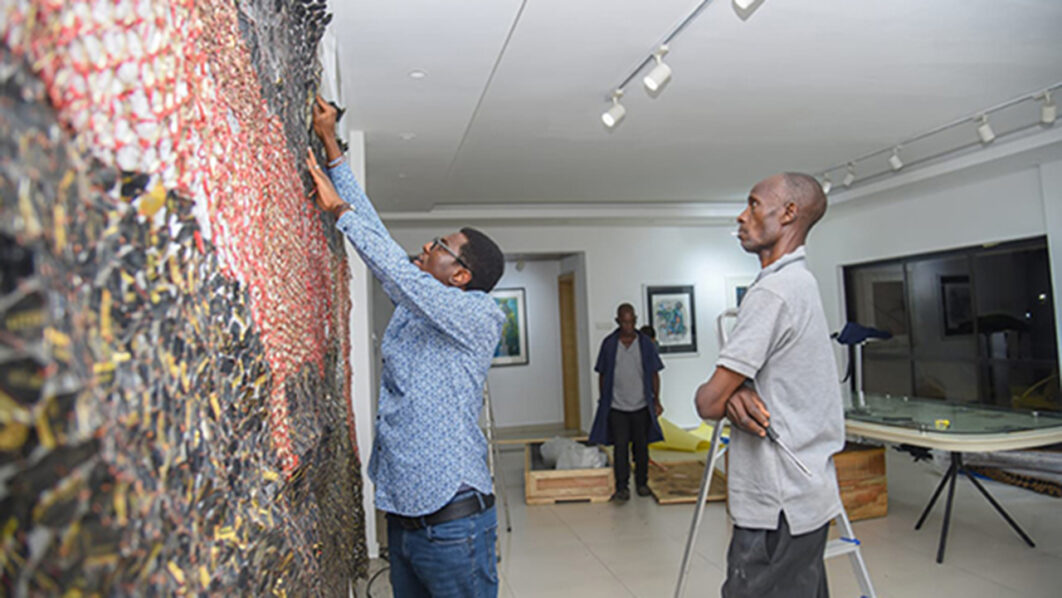
Back in America, within Princeton University’s suburban campus, Iheanyi Onwuegbucha harboured an unyielding passion. His mission was clear: to rebalance the art world’s narrative by highlighting the often-overlooked greats of African contemporary art.
But then, this passion had its beginnings in the lecture halls of the University of Nigeria, Nsukka’s Fine and Applied Arts Department. That was when it dawned on him that the absence of Western curators left African artists shrouded in obscurity. He indeed realised that African artists needed advocates to elevate their work on a global scale. Eager to change this narrative, he yearned to become a curator himself.
Then things began to happen around him. Professor Chijioke Onuora took him under his wings and he witnessed a blossoming of his curatorial skills under the reverted art teacher’s mentorship. He curated the university’s 50th-anniversary exhibition and later the convocation show, featuring Uche Okeke’s historical works alongside his classmates’. The success of these shows earned him a commendation from the Vice Chancellor.
Of course, there was also Chika Okeke-Agulu’s visit and talk about his project, Who Knows Tomorrow, which sparked a fire within him, inspiring him to pursue curatorship.
After his national service, Onwuegbucha joined the Life in My City Art Festival (LIMCAF) as festival secretary, discovering emerging artists and honing his curatorial skills. During one of the LIMCAF’s editions, he met Bisi Silva, a pivotal influence on his career. In 2015, he co-curated the Anya Fulu Ugo exhibition, honouring El Anatsui and Obiora Udechukwu. His journey continued at the Thought Pyramid Art Centre in Abuja, where he realised curating involved generating discourse and scholarship.
His years of tireless work culminated in his curating the ongoing Kindred Spirits exhibition, a landmark celebration of the Aka Circle of Artists’ innovative spirit, which is holding at kó Gallery in Ikoyi, Lagos. This eclectic group of 15 artistic trailblazers, founded by El Anatsui and Obiora Udechukwu, defied categorisation, pushing boundaries with their inventive mediums. Their influence knew no borders, leaving an indelible mark on the art world.
As he wended his way through the labyrinth of art history, he rediscovered the Aka Circle’s bold sociopolitical commentary, particularly on postcolonial Nigeria. Their work was a clarion call—a challenge to the status quo. Much to his fascination, these artists, tied to the Nsukka School, tackled the complexities of their time with distinct flair.
But his quest to change the narrative wasn’t without its challenges. First, he needed to track down the works by deceased members of the collective, and this proved to be a daunting task, no thanks to Nigeria’s lack of art documentation. Yet he persevered, driven by a sense of justice. Gathering all 15 members’ works was a triumph, a testimonial of his unwavering dedication, now a shining exemplar of his curatorial expertise.
“I hope this exhibition inspires younger artists to carry forward the legacy of the Aka group,” Onwuegbucha enthuses with a note of conviction. “To boldly engage with the world around them, using their art as a lens for commentary and change.”
Asked about his curatorial philosophy, he says it prioritises artists as essential to understanding their work, making art accessible to a broad audience, and recognising it as a reflection of society and artists’ experiences.
As for his curatorial process, it starts with studio visits and extensive discussions with artists. He balances their vision with his own, co-creating exhibitions that communicate directly with the public. As a cultural producer, he understands the importance of shaping cultural discourse and exercising influence with caution and responsibility.
Back to his odyssey, he pursued an MA in Art Gallery and Museum Studies at the University of Leeds, then joined the Centre for Contemporary Art (CCA), Lagos, as associate curator under Bisi Silva’s guidance.
At CCA, Onwuegbucha recognised the lack of accessible resources for African artists. Hence, he conducted research on Colette Omogbai, a significant step in his curatorial journey. His philosophy now centres on ensuring African artists received their rightful place in history, making art accessible and meaningful to a broad audience.
Now, as the National Museum of African Art’s pre-doctoral research fellow, Onwuegbucha stood at the forefront of a movement. His work was a powerful affirmation of the impact of curatorial activism, challenging the status quo, and paving the way for a more inclusive art world.






